Analyzing Brexit's Impact on Hospitality Sector Operations
VerifiedAdded on 2022/08/20
|7
|2238
|13
Essay
AI Summary
This essay critically analyzes the impact of Brexit on the UK hospitality and hotel industry. It examines the challenges related to EU-migrant workers, import and export of goods, investment, and government support, while also exploring the opportunities that may arise. The essay discusses various Brexit scenarios, including a no-deal and an agreed deal, and their potential consequences for the sector. Key challenges include reduced consumer confidence, difficulties in accessing low-skilled labor, increased operating costs, and supply chain disruptions. The essay also highlights the impact of uncertain investments and reduced government support. Possible responses by hospitality companies, such as adapting supply chain operations, implementing technological advancements, and finding cost-effective methods, are also analyzed. The essay concludes that while Brexit presents significant challenges, companies can mitigate the negative impacts by adapting their strategies and exploring new opportunities.
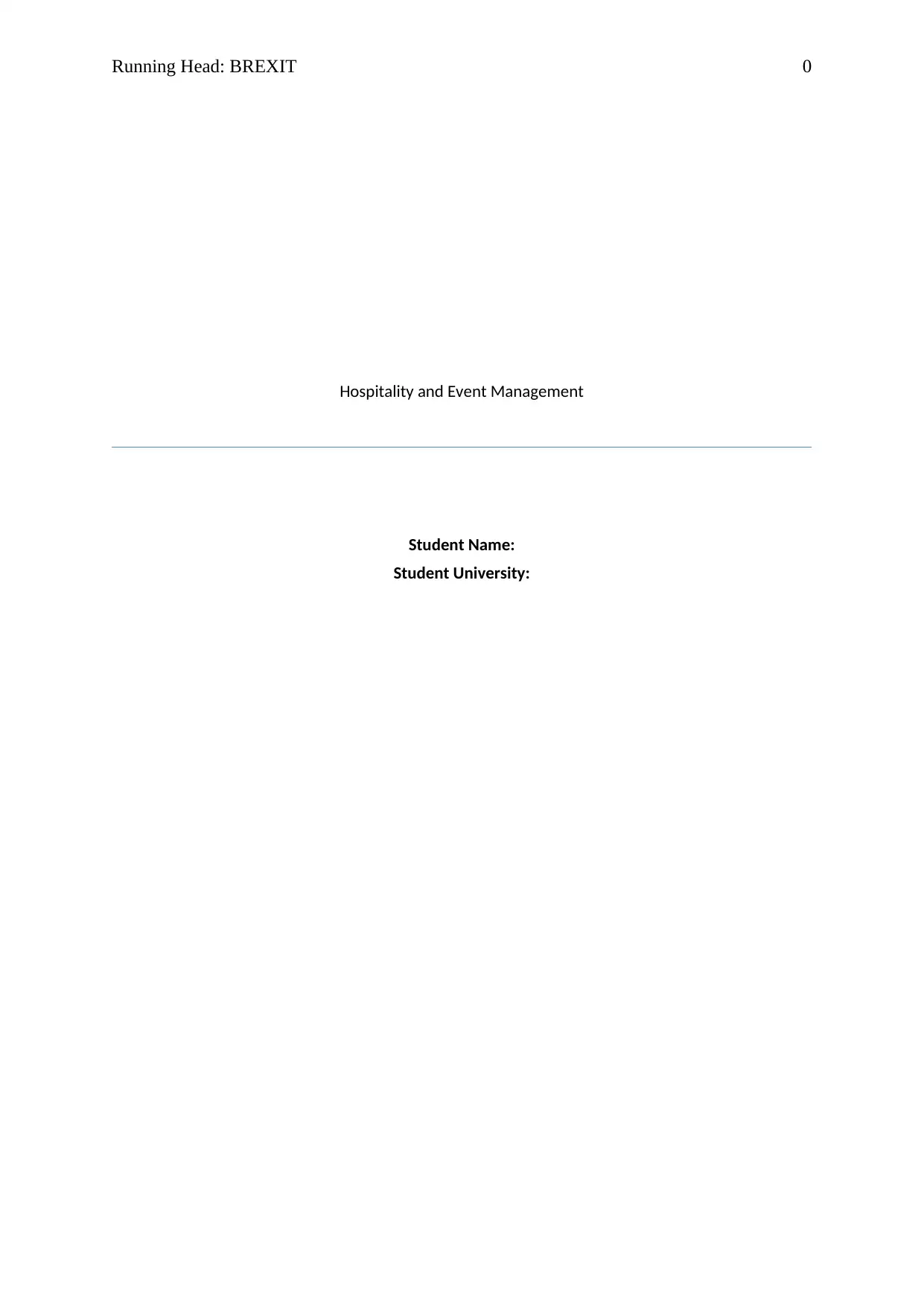
Running Head: BREXIT 0
Hospitality and Event Management
Student Name:
Student University:
Hospitality and Event Management
Student Name:
Student University:
Paraphrase This Document
Need a fresh take? Get an instant paraphrase of this document with our AI Paraphraser
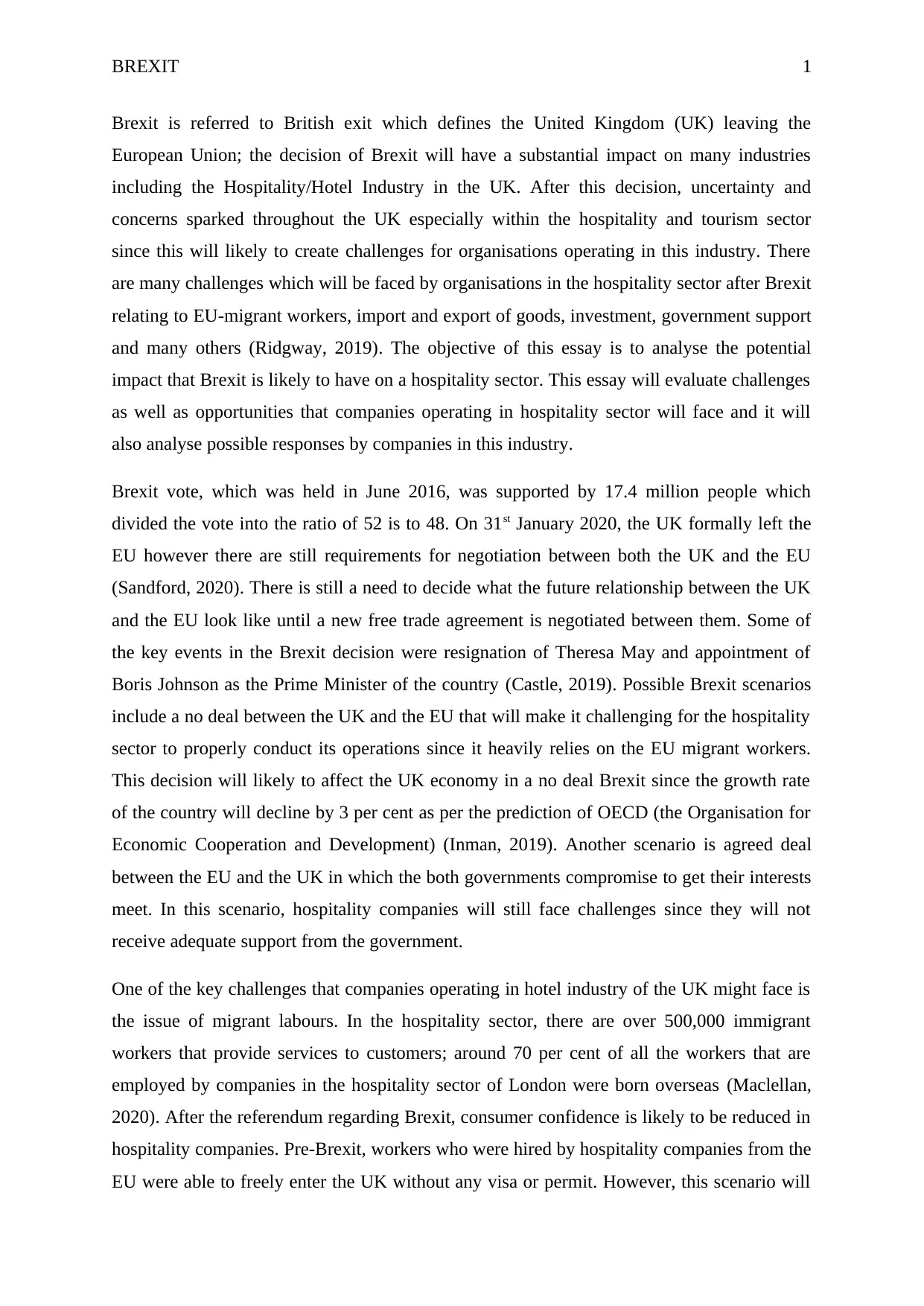
BREXIT 1
Brexit is referred to British exit which defines the United Kingdom (UK) leaving the
European Union; the decision of Brexit will have a substantial impact on many industries
including the Hospitality/Hotel Industry in the UK. After this decision, uncertainty and
concerns sparked throughout the UK especially within the hospitality and tourism sector
since this will likely to create challenges for organisations operating in this industry. There
are many challenges which will be faced by organisations in the hospitality sector after Brexit
relating to EU-migrant workers, import and export of goods, investment, government support
and many others (Ridgway, 2019). The objective of this essay is to analyse the potential
impact that Brexit is likely to have on a hospitality sector. This essay will evaluate challenges
as well as opportunities that companies operating in hospitality sector will face and it will
also analyse possible responses by companies in this industry.
Brexit vote, which was held in June 2016, was supported by 17.4 million people which
divided the vote into the ratio of 52 is to 48. On 31st January 2020, the UK formally left the
EU however there are still requirements for negotiation between both the UK and the EU
(Sandford, 2020). There is still a need to decide what the future relationship between the UK
and the EU look like until a new free trade agreement is negotiated between them. Some of
the key events in the Brexit decision were resignation of Theresa May and appointment of
Boris Johnson as the Prime Minister of the country (Castle, 2019). Possible Brexit scenarios
include a no deal between the UK and the EU that will make it challenging for the hospitality
sector to properly conduct its operations since it heavily relies on the EU migrant workers.
This decision will likely to affect the UK economy in a no deal Brexit since the growth rate
of the country will decline by 3 per cent as per the prediction of OECD (the Organisation for
Economic Cooperation and Development) (Inman, 2019). Another scenario is agreed deal
between the EU and the UK in which the both governments compromise to get their interests
meet. In this scenario, hospitality companies will still face challenges since they will not
receive adequate support from the government.
One of the key challenges that companies operating in hotel industry of the UK might face is
the issue of migrant labours. In the hospitality sector, there are over 500,000 immigrant
workers that provide services to customers; around 70 per cent of all the workers that are
employed by companies in the hospitality sector of London were born overseas (Maclellan,
2020). After the referendum regarding Brexit, consumer confidence is likely to be reduced in
hospitality companies. Pre-Brexit, workers who were hired by hospitality companies from the
EU were able to freely enter the UK without any visa or permit. However, this scenario will
Brexit is referred to British exit which defines the United Kingdom (UK) leaving the
European Union; the decision of Brexit will have a substantial impact on many industries
including the Hospitality/Hotel Industry in the UK. After this decision, uncertainty and
concerns sparked throughout the UK especially within the hospitality and tourism sector
since this will likely to create challenges for organisations operating in this industry. There
are many challenges which will be faced by organisations in the hospitality sector after Brexit
relating to EU-migrant workers, import and export of goods, investment, government support
and many others (Ridgway, 2019). The objective of this essay is to analyse the potential
impact that Brexit is likely to have on a hospitality sector. This essay will evaluate challenges
as well as opportunities that companies operating in hospitality sector will face and it will
also analyse possible responses by companies in this industry.
Brexit vote, which was held in June 2016, was supported by 17.4 million people which
divided the vote into the ratio of 52 is to 48. On 31st January 2020, the UK formally left the
EU however there are still requirements for negotiation between both the UK and the EU
(Sandford, 2020). There is still a need to decide what the future relationship between the UK
and the EU look like until a new free trade agreement is negotiated between them. Some of
the key events in the Brexit decision were resignation of Theresa May and appointment of
Boris Johnson as the Prime Minister of the country (Castle, 2019). Possible Brexit scenarios
include a no deal between the UK and the EU that will make it challenging for the hospitality
sector to properly conduct its operations since it heavily relies on the EU migrant workers.
This decision will likely to affect the UK economy in a no deal Brexit since the growth rate
of the country will decline by 3 per cent as per the prediction of OECD (the Organisation for
Economic Cooperation and Development) (Inman, 2019). Another scenario is agreed deal
between the EU and the UK in which the both governments compromise to get their interests
meet. In this scenario, hospitality companies will still face challenges since they will not
receive adequate support from the government.
One of the key challenges that companies operating in hotel industry of the UK might face is
the issue of migrant labours. In the hospitality sector, there are over 500,000 immigrant
workers that provide services to customers; around 70 per cent of all the workers that are
employed by companies in the hospitality sector of London were born overseas (Maclellan,
2020). After the referendum regarding Brexit, consumer confidence is likely to be reduced in
hospitality companies. Pre-Brexit, workers who were hired by hospitality companies from the
EU were able to freely enter the UK without any visa or permit. However, this scenario will
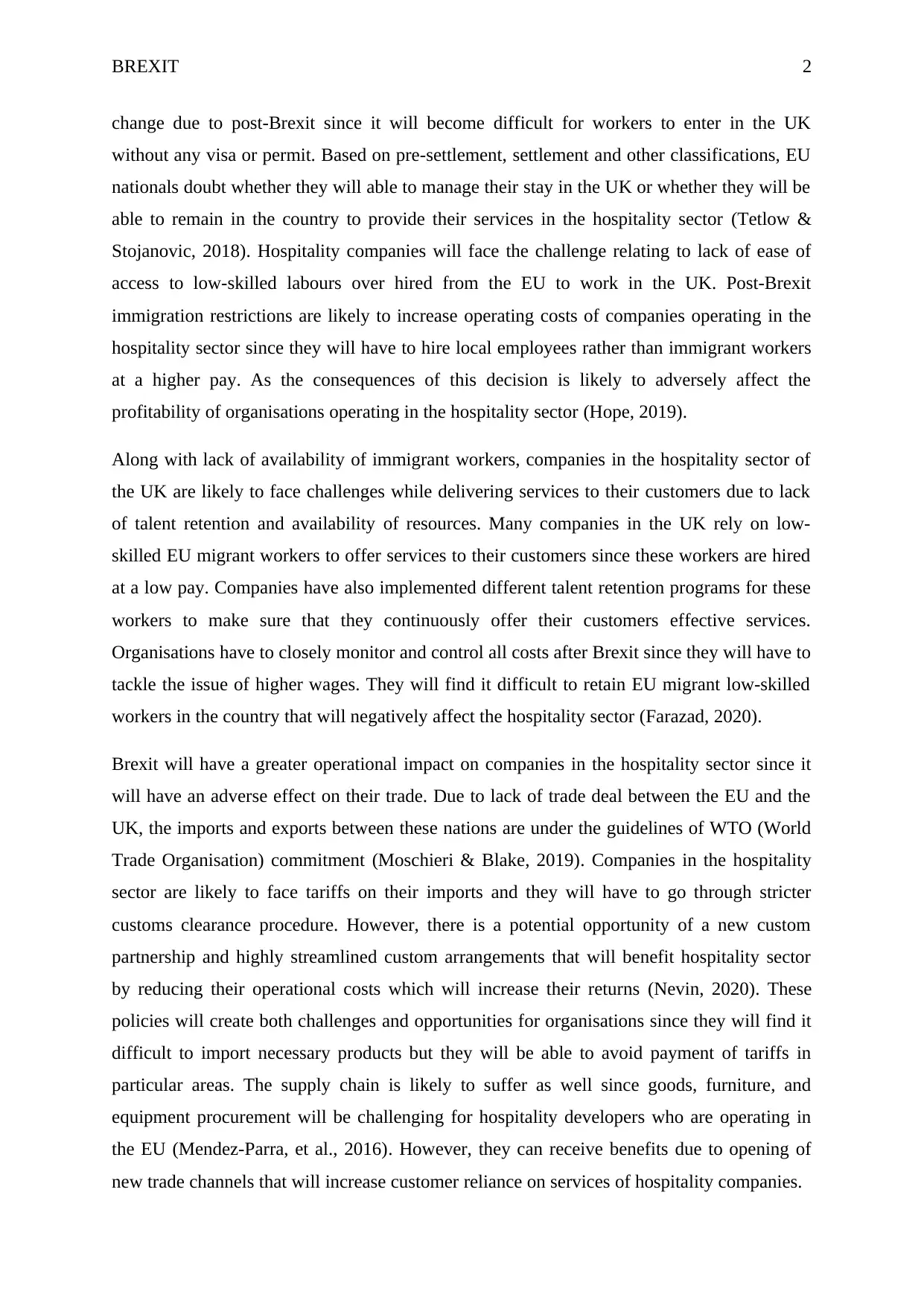
BREXIT 2
change due to post-Brexit since it will become difficult for workers to enter in the UK
without any visa or permit. Based on pre-settlement, settlement and other classifications, EU
nationals doubt whether they will able to manage their stay in the UK or whether they will be
able to remain in the country to provide their services in the hospitality sector (Tetlow &
Stojanovic, 2018). Hospitality companies will face the challenge relating to lack of ease of
access to low-skilled labours over hired from the EU to work in the UK. Post-Brexit
immigration restrictions are likely to increase operating costs of companies operating in the
hospitality sector since they will have to hire local employees rather than immigrant workers
at a higher pay. As the consequences of this decision is likely to adversely affect the
profitability of organisations operating in the hospitality sector (Hope, 2019).
Along with lack of availability of immigrant workers, companies in the hospitality sector of
the UK are likely to face challenges while delivering services to their customers due to lack
of talent retention and availability of resources. Many companies in the UK rely on low-
skilled EU migrant workers to offer services to their customers since these workers are hired
at a low pay. Companies have also implemented different talent retention programs for these
workers to make sure that they continuously offer their customers effective services.
Organisations have to closely monitor and control all costs after Brexit since they will have to
tackle the issue of higher wages. They will find it difficult to retain EU migrant low-skilled
workers in the country that will negatively affect the hospitality sector (Farazad, 2020).
Brexit will have a greater operational impact on companies in the hospitality sector since it
will have an adverse effect on their trade. Due to lack of trade deal between the EU and the
UK, the imports and exports between these nations are under the guidelines of WTO (World
Trade Organisation) commitment (Moschieri & Blake, 2019). Companies in the hospitality
sector are likely to face tariffs on their imports and they will have to go through stricter
customs clearance procedure. However, there is a potential opportunity of a new custom
partnership and highly streamlined custom arrangements that will benefit hospitality sector
by reducing their operational costs which will increase their returns (Nevin, 2020). These
policies will create both challenges and opportunities for organisations since they will find it
difficult to import necessary products but they will be able to avoid payment of tariffs in
particular areas. The supply chain is likely to suffer as well since goods, furniture, and
equipment procurement will be challenging for hospitality developers who are operating in
the EU (Mendez-Parra, et al., 2016). However, they can receive benefits due to opening of
new trade channels that will increase customer reliance on services of hospitality companies.
change due to post-Brexit since it will become difficult for workers to enter in the UK
without any visa or permit. Based on pre-settlement, settlement and other classifications, EU
nationals doubt whether they will able to manage their stay in the UK or whether they will be
able to remain in the country to provide their services in the hospitality sector (Tetlow &
Stojanovic, 2018). Hospitality companies will face the challenge relating to lack of ease of
access to low-skilled labours over hired from the EU to work in the UK. Post-Brexit
immigration restrictions are likely to increase operating costs of companies operating in the
hospitality sector since they will have to hire local employees rather than immigrant workers
at a higher pay. As the consequences of this decision is likely to adversely affect the
profitability of organisations operating in the hospitality sector (Hope, 2019).
Along with lack of availability of immigrant workers, companies in the hospitality sector of
the UK are likely to face challenges while delivering services to their customers due to lack
of talent retention and availability of resources. Many companies in the UK rely on low-
skilled EU migrant workers to offer services to their customers since these workers are hired
at a low pay. Companies have also implemented different talent retention programs for these
workers to make sure that they continuously offer their customers effective services.
Organisations have to closely monitor and control all costs after Brexit since they will have to
tackle the issue of higher wages. They will find it difficult to retain EU migrant low-skilled
workers in the country that will negatively affect the hospitality sector (Farazad, 2020).
Brexit will have a greater operational impact on companies in the hospitality sector since it
will have an adverse effect on their trade. Due to lack of trade deal between the EU and the
UK, the imports and exports between these nations are under the guidelines of WTO (World
Trade Organisation) commitment (Moschieri & Blake, 2019). Companies in the hospitality
sector are likely to face tariffs on their imports and they will have to go through stricter
customs clearance procedure. However, there is a potential opportunity of a new custom
partnership and highly streamlined custom arrangements that will benefit hospitality sector
by reducing their operational costs which will increase their returns (Nevin, 2020). These
policies will create both challenges and opportunities for organisations since they will find it
difficult to import necessary products but they will be able to avoid payment of tariffs in
particular areas. The supply chain is likely to suffer as well since goods, furniture, and
equipment procurement will be challenging for hospitality developers who are operating in
the EU (Mendez-Parra, et al., 2016). However, they can receive benefits due to opening of
new trade channels that will increase customer reliance on services of hospitality companies.
⊘ This is a preview!⊘
Do you want full access?
Subscribe today to unlock all pages.

Trusted by 1+ million students worldwide
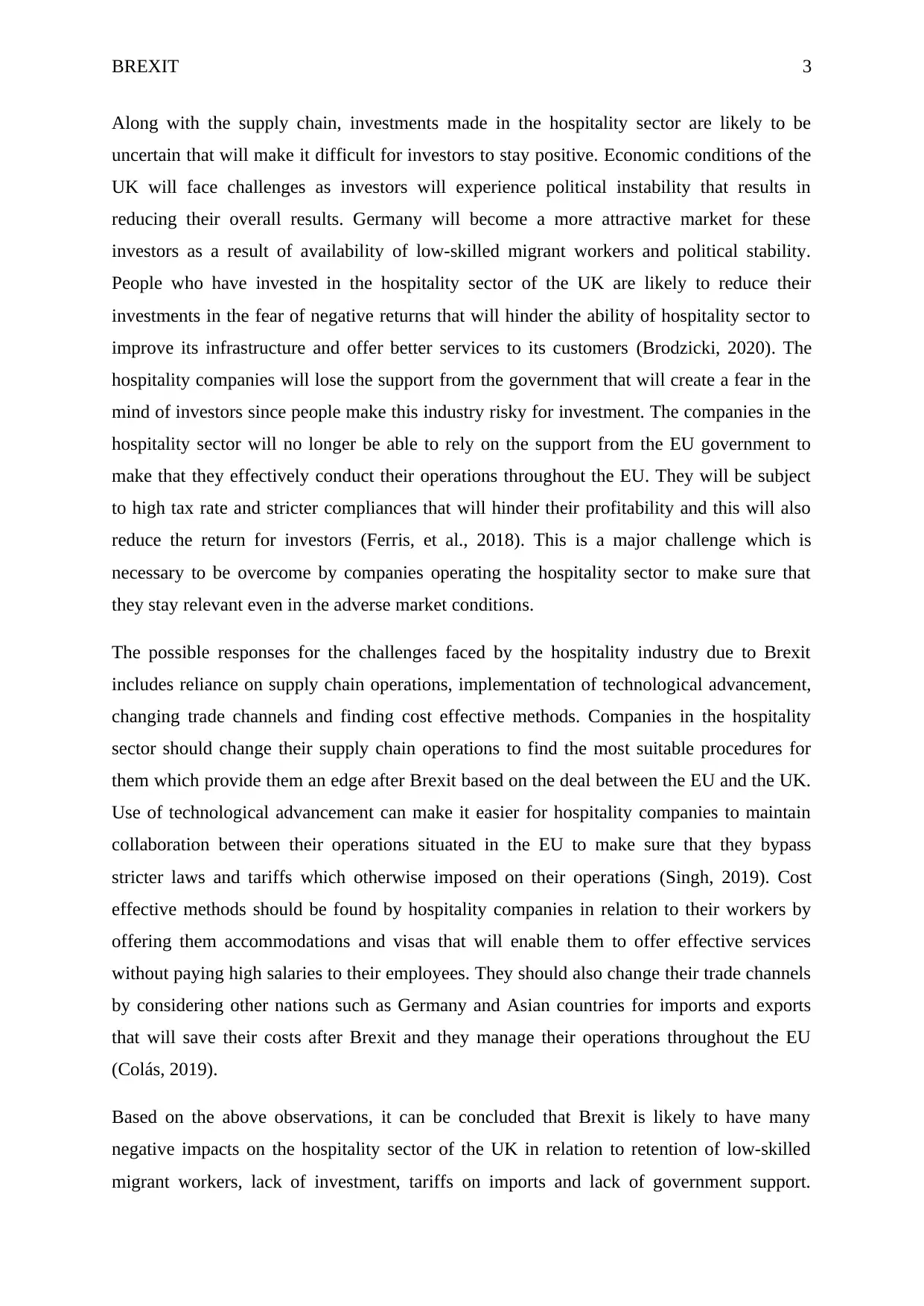
BREXIT 3
Along with the supply chain, investments made in the hospitality sector are likely to be
uncertain that will make it difficult for investors to stay positive. Economic conditions of the
UK will face challenges as investors will experience political instability that results in
reducing their overall results. Germany will become a more attractive market for these
investors as a result of availability of low-skilled migrant workers and political stability.
People who have invested in the hospitality sector of the UK are likely to reduce their
investments in the fear of negative returns that will hinder the ability of hospitality sector to
improve its infrastructure and offer better services to its customers (Brodzicki, 2020). The
hospitality companies will lose the support from the government that will create a fear in the
mind of investors since people make this industry risky for investment. The companies in the
hospitality sector will no longer be able to rely on the support from the EU government to
make that they effectively conduct their operations throughout the EU. They will be subject
to high tax rate and stricter compliances that will hinder their profitability and this will also
reduce the return for investors (Ferris, et al., 2018). This is a major challenge which is
necessary to be overcome by companies operating the hospitality sector to make sure that
they stay relevant even in the adverse market conditions.
The possible responses for the challenges faced by the hospitality industry due to Brexit
includes reliance on supply chain operations, implementation of technological advancement,
changing trade channels and finding cost effective methods. Companies in the hospitality
sector should change their supply chain operations to find the most suitable procedures for
them which provide them an edge after Brexit based on the deal between the EU and the UK.
Use of technological advancement can make it easier for hospitality companies to maintain
collaboration between their operations situated in the EU to make sure that they bypass
stricter laws and tariffs which otherwise imposed on their operations (Singh, 2019). Cost
effective methods should be found by hospitality companies in relation to their workers by
offering them accommodations and visas that will enable them to offer effective services
without paying high salaries to their employees. They should also change their trade channels
by considering other nations such as Germany and Asian countries for imports and exports
that will save their costs after Brexit and they manage their operations throughout the EU
(Colás, 2019).
Based on the above observations, it can be concluded that Brexit is likely to have many
negative impacts on the hospitality sector of the UK in relation to retention of low-skilled
migrant workers, lack of investment, tariffs on imports and lack of government support.
Along with the supply chain, investments made in the hospitality sector are likely to be
uncertain that will make it difficult for investors to stay positive. Economic conditions of the
UK will face challenges as investors will experience political instability that results in
reducing their overall results. Germany will become a more attractive market for these
investors as a result of availability of low-skilled migrant workers and political stability.
People who have invested in the hospitality sector of the UK are likely to reduce their
investments in the fear of negative returns that will hinder the ability of hospitality sector to
improve its infrastructure and offer better services to its customers (Brodzicki, 2020). The
hospitality companies will lose the support from the government that will create a fear in the
mind of investors since people make this industry risky for investment. The companies in the
hospitality sector will no longer be able to rely on the support from the EU government to
make that they effectively conduct their operations throughout the EU. They will be subject
to high tax rate and stricter compliances that will hinder their profitability and this will also
reduce the return for investors (Ferris, et al., 2018). This is a major challenge which is
necessary to be overcome by companies operating the hospitality sector to make sure that
they stay relevant even in the adverse market conditions.
The possible responses for the challenges faced by the hospitality industry due to Brexit
includes reliance on supply chain operations, implementation of technological advancement,
changing trade channels and finding cost effective methods. Companies in the hospitality
sector should change their supply chain operations to find the most suitable procedures for
them which provide them an edge after Brexit based on the deal between the EU and the UK.
Use of technological advancement can make it easier for hospitality companies to maintain
collaboration between their operations situated in the EU to make sure that they bypass
stricter laws and tariffs which otherwise imposed on their operations (Singh, 2019). Cost
effective methods should be found by hospitality companies in relation to their workers by
offering them accommodations and visas that will enable them to offer effective services
without paying high salaries to their employees. They should also change their trade channels
by considering other nations such as Germany and Asian countries for imports and exports
that will save their costs after Brexit and they manage their operations throughout the EU
(Colás, 2019).
Based on the above observations, it can be concluded that Brexit is likely to have many
negative impacts on the hospitality sector of the UK in relation to retention of low-skilled
migrant workers, lack of investment, tariffs on imports and lack of government support.
Paraphrase This Document
Need a fresh take? Get an instant paraphrase of this document with our AI Paraphraser
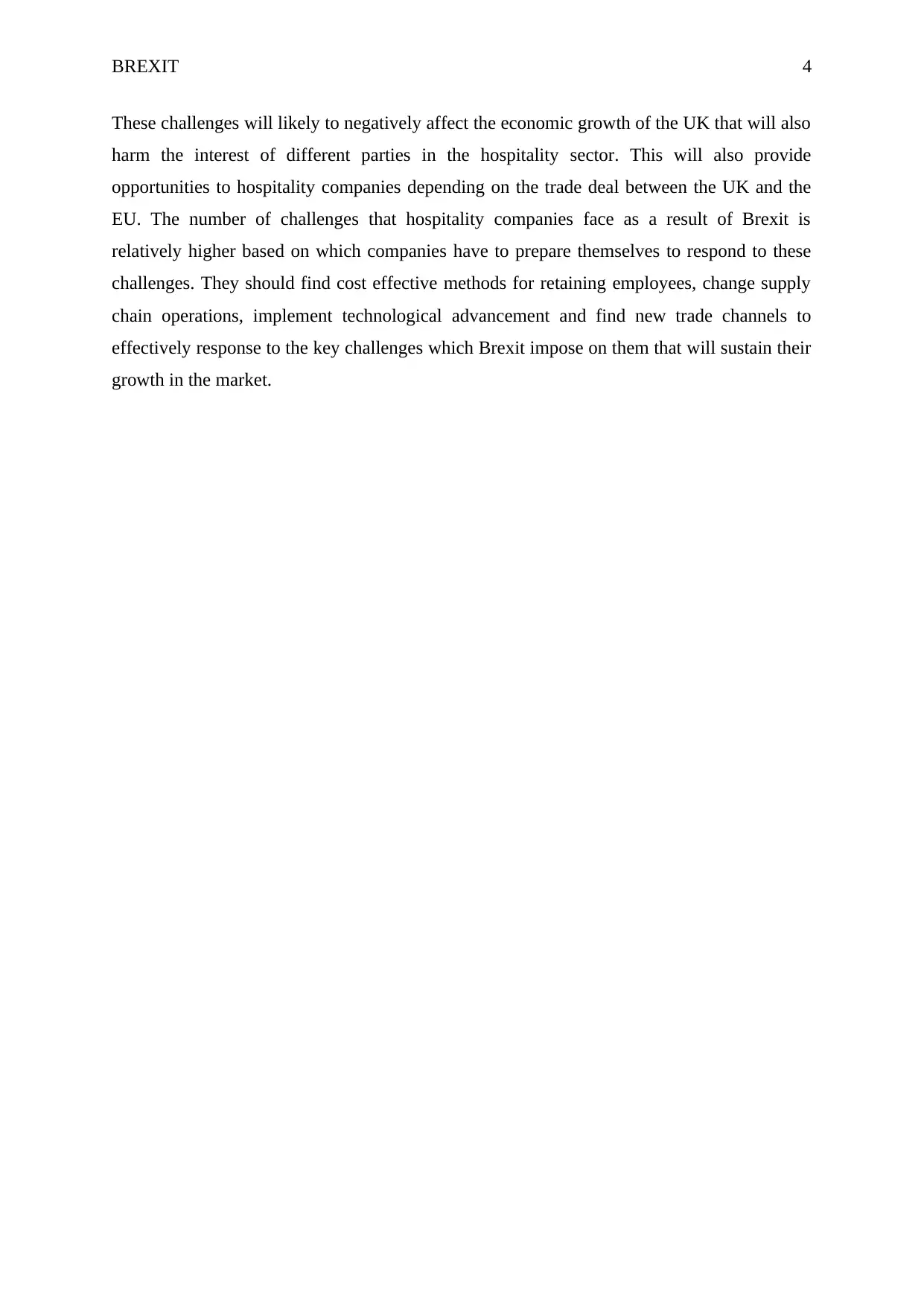
BREXIT 4
These challenges will likely to negatively affect the economic growth of the UK that will also
harm the interest of different parties in the hospitality sector. This will also provide
opportunities to hospitality companies depending on the trade deal between the UK and the
EU. The number of challenges that hospitality companies face as a result of Brexit is
relatively higher based on which companies have to prepare themselves to respond to these
challenges. They should find cost effective methods for retaining employees, change supply
chain operations, implement technological advancement and find new trade channels to
effectively response to the key challenges which Brexit impose on them that will sustain their
growth in the market.
These challenges will likely to negatively affect the economic growth of the UK that will also
harm the interest of different parties in the hospitality sector. This will also provide
opportunities to hospitality companies depending on the trade deal between the UK and the
EU. The number of challenges that hospitality companies face as a result of Brexit is
relatively higher based on which companies have to prepare themselves to respond to these
challenges. They should find cost effective methods for retaining employees, change supply
chain operations, implement technological advancement and find new trade channels to
effectively response to the key challenges which Brexit impose on them that will sustain their
growth in the market.
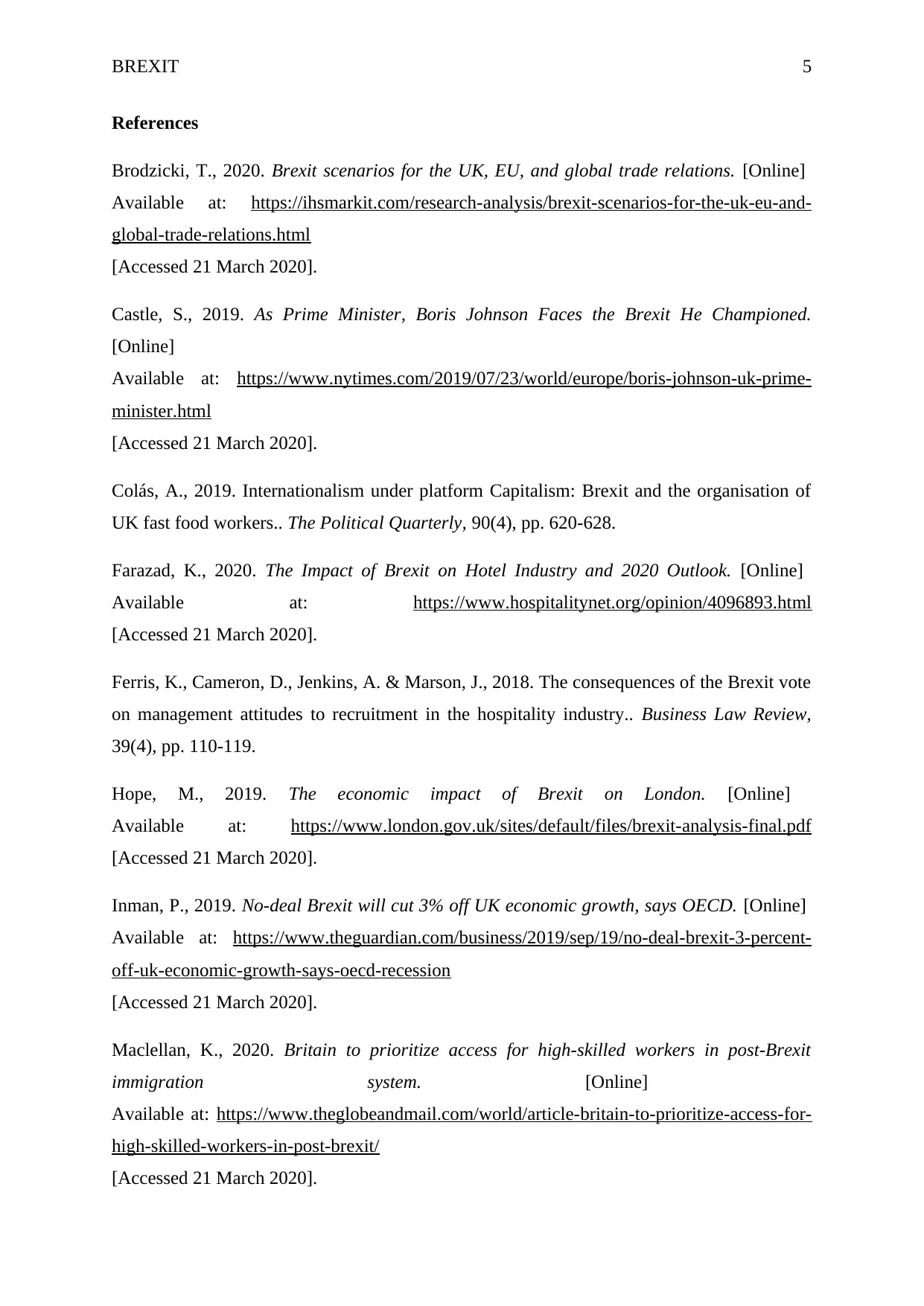
BREXIT 5
References
Brodzicki, T., 2020. Brexit scenarios for the UK, EU, and global trade relations. [Online]
Available at: https://ihsmarkit.com/research-analysis/brexit-scenarios-for-the-uk-eu-and-
global-trade-relations.html
[Accessed 21 March 2020].
Castle, S., 2019. As Prime Minister, Boris Johnson Faces the Brexit He Championed.
[Online]
Available at: https://www.nytimes.com/2019/07/23/world/europe/boris-johnson-uk-prime-
minister.html
[Accessed 21 March 2020].
Colás, A., 2019. Internationalism under platform Capitalism: Brexit and the organisation of
UK fast food workers.. The Political Quarterly, 90(4), pp. 620-628.
Farazad, K., 2020. The Impact of Brexit on Hotel Industry and 2020 Outlook. [Online]
Available at: https://www.hospitalitynet.org/opinion/4096893.html
[Accessed 21 March 2020].
Ferris, K., Cameron, D., Jenkins, A. & Marson, J., 2018. The consequences of the Brexit vote
on management attitudes to recruitment in the hospitality industry.. Business Law Review,
39(4), pp. 110-119.
Hope, M., 2019. The economic impact of Brexit on London. [Online]
Available at: https://www.london.gov.uk/sites/default/files/brexit-analysis-final.pdf
[Accessed 21 March 2020].
Inman, P., 2019. No-deal Brexit will cut 3% off UK economic growth, says OECD. [Online]
Available at: https://www.theguardian.com/business/2019/sep/19/no-deal-brexit-3-percent-
off-uk-economic-growth-says-oecd-recession
[Accessed 21 March 2020].
Maclellan, K., 2020. Britain to prioritize access for high-skilled workers in post-Brexit
immigration system. [Online]
Available at: https://www.theglobeandmail.com/world/article-britain-to-prioritize-access-for-
high-skilled-workers-in-post-brexit/
[Accessed 21 March 2020].
References
Brodzicki, T., 2020. Brexit scenarios for the UK, EU, and global trade relations. [Online]
Available at: https://ihsmarkit.com/research-analysis/brexit-scenarios-for-the-uk-eu-and-
global-trade-relations.html
[Accessed 21 March 2020].
Castle, S., 2019. As Prime Minister, Boris Johnson Faces the Brexit He Championed.
[Online]
Available at: https://www.nytimes.com/2019/07/23/world/europe/boris-johnson-uk-prime-
minister.html
[Accessed 21 March 2020].
Colás, A., 2019. Internationalism under platform Capitalism: Brexit and the organisation of
UK fast food workers.. The Political Quarterly, 90(4), pp. 620-628.
Farazad, K., 2020. The Impact of Brexit on Hotel Industry and 2020 Outlook. [Online]
Available at: https://www.hospitalitynet.org/opinion/4096893.html
[Accessed 21 March 2020].
Ferris, K., Cameron, D., Jenkins, A. & Marson, J., 2018. The consequences of the Brexit vote
on management attitudes to recruitment in the hospitality industry.. Business Law Review,
39(4), pp. 110-119.
Hope, M., 2019. The economic impact of Brexit on London. [Online]
Available at: https://www.london.gov.uk/sites/default/files/brexit-analysis-final.pdf
[Accessed 21 March 2020].
Inman, P., 2019. No-deal Brexit will cut 3% off UK economic growth, says OECD. [Online]
Available at: https://www.theguardian.com/business/2019/sep/19/no-deal-brexit-3-percent-
off-uk-economic-growth-says-oecd-recession
[Accessed 21 March 2020].
Maclellan, K., 2020. Britain to prioritize access for high-skilled workers in post-Brexit
immigration system. [Online]
Available at: https://www.theglobeandmail.com/world/article-britain-to-prioritize-access-for-
high-skilled-workers-in-post-brexit/
[Accessed 21 March 2020].
⊘ This is a preview!⊘
Do you want full access?
Subscribe today to unlock all pages.

Trusted by 1+ million students worldwide
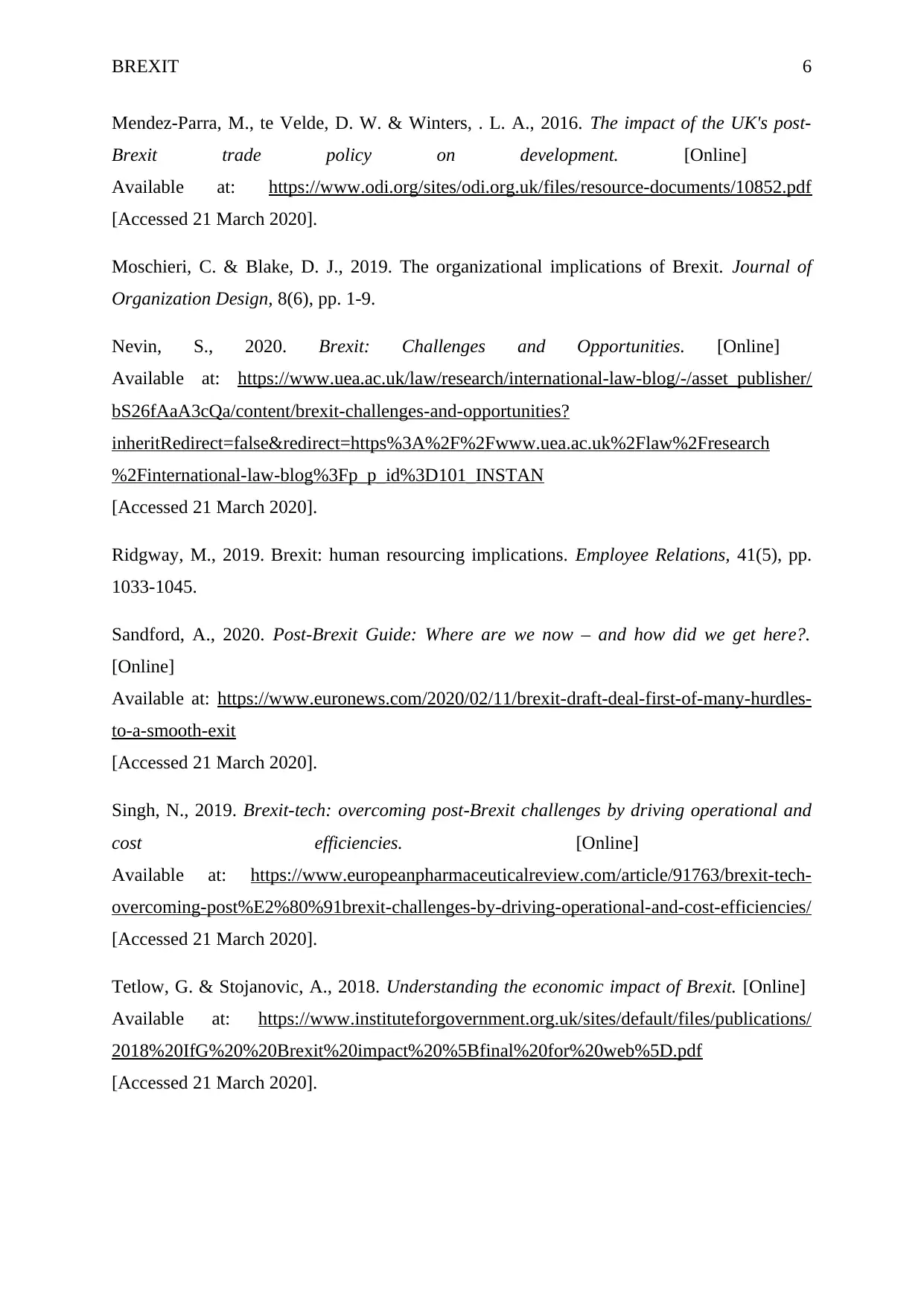
BREXIT 6
Mendez-Parra, M., te Velde, D. W. & Winters, . L. A., 2016. The impact of the UK's post-
Brexit trade policy on development. [Online]
Available at: https://www.odi.org/sites/odi.org.uk/files/resource-documents/10852.pdf
[Accessed 21 March 2020].
Moschieri, C. & Blake, D. J., 2019. The organizational implications of Brexit. Journal of
Organization Design, 8(6), pp. 1-9.
Nevin, S., 2020. Brexit: Challenges and Opportunities. [Online]
Available at: https://www.uea.ac.uk/law/research/international-law-blog/-/asset_publisher/
bS26fAaA3cQa/content/brexit-challenges-and-opportunities?
inheritRedirect=false&redirect=https%3A%2F%2Fwww.uea.ac.uk%2Flaw%2Fresearch
%2Finternational-law-blog%3Fp_p_id%3D101_INSTAN
[Accessed 21 March 2020].
Ridgway, M., 2019. Brexit: human resourcing implications. Employee Relations, 41(5), pp.
1033-1045.
Sandford, A., 2020. Post-Brexit Guide: Where are we now – and how did we get here?.
[Online]
Available at: https://www.euronews.com/2020/02/11/brexit-draft-deal-first-of-many-hurdles-
to-a-smooth-exit
[Accessed 21 March 2020].
Singh, N., 2019. Brexit-tech: overcoming post-Brexit challenges by driving operational and
cost efficiencies. [Online]
Available at: https://www.europeanpharmaceuticalreview.com/article/91763/brexit-tech-
overcoming-post%E2%80%91brexit-challenges-by-driving-operational-and-cost-efficiencies/
[Accessed 21 March 2020].
Tetlow, G. & Stojanovic, A., 2018. Understanding the economic impact of Brexit. [Online]
Available at: https://www.instituteforgovernment.org.uk/sites/default/files/publications/
2018%20IfG%20%20Brexit%20impact%20%5Bfinal%20for%20web%5D.pdf
[Accessed 21 March 2020].
Mendez-Parra, M., te Velde, D. W. & Winters, . L. A., 2016. The impact of the UK's post-
Brexit trade policy on development. [Online]
Available at: https://www.odi.org/sites/odi.org.uk/files/resource-documents/10852.pdf
[Accessed 21 March 2020].
Moschieri, C. & Blake, D. J., 2019. The organizational implications of Brexit. Journal of
Organization Design, 8(6), pp. 1-9.
Nevin, S., 2020. Brexit: Challenges and Opportunities. [Online]
Available at: https://www.uea.ac.uk/law/research/international-law-blog/-/asset_publisher/
bS26fAaA3cQa/content/brexit-challenges-and-opportunities?
inheritRedirect=false&redirect=https%3A%2F%2Fwww.uea.ac.uk%2Flaw%2Fresearch
%2Finternational-law-blog%3Fp_p_id%3D101_INSTAN
[Accessed 21 March 2020].
Ridgway, M., 2019. Brexit: human resourcing implications. Employee Relations, 41(5), pp.
1033-1045.
Sandford, A., 2020. Post-Brexit Guide: Where are we now – and how did we get here?.
[Online]
Available at: https://www.euronews.com/2020/02/11/brexit-draft-deal-first-of-many-hurdles-
to-a-smooth-exit
[Accessed 21 March 2020].
Singh, N., 2019. Brexit-tech: overcoming post-Brexit challenges by driving operational and
cost efficiencies. [Online]
Available at: https://www.europeanpharmaceuticalreview.com/article/91763/brexit-tech-
overcoming-post%E2%80%91brexit-challenges-by-driving-operational-and-cost-efficiencies/
[Accessed 21 March 2020].
Tetlow, G. & Stojanovic, A., 2018. Understanding the economic impact of Brexit. [Online]
Available at: https://www.instituteforgovernment.org.uk/sites/default/files/publications/
2018%20IfG%20%20Brexit%20impact%20%5Bfinal%20for%20web%5D.pdf
[Accessed 21 March 2020].
1 out of 7
Related Documents
Your All-in-One AI-Powered Toolkit for Academic Success.
+13062052269
info@desklib.com
Available 24*7 on WhatsApp / Email
![[object Object]](/_next/static/media/star-bottom.7253800d.svg)
Unlock your academic potential
Copyright © 2020–2026 A2Z Services. All Rights Reserved. Developed and managed by ZUCOL.





